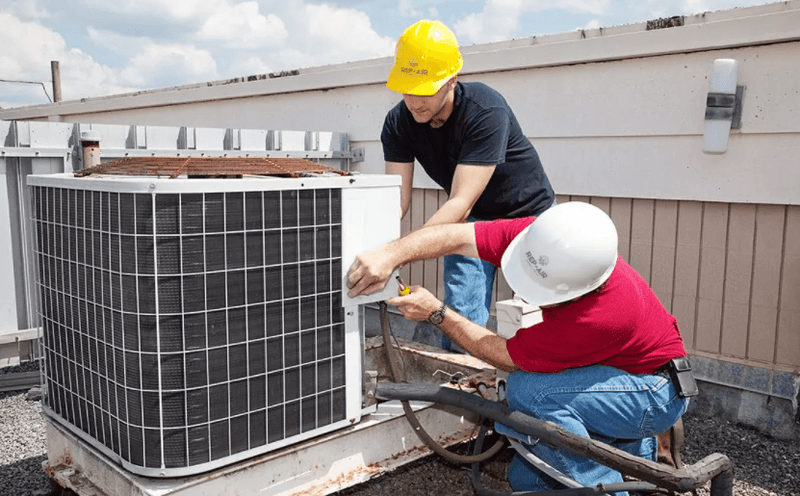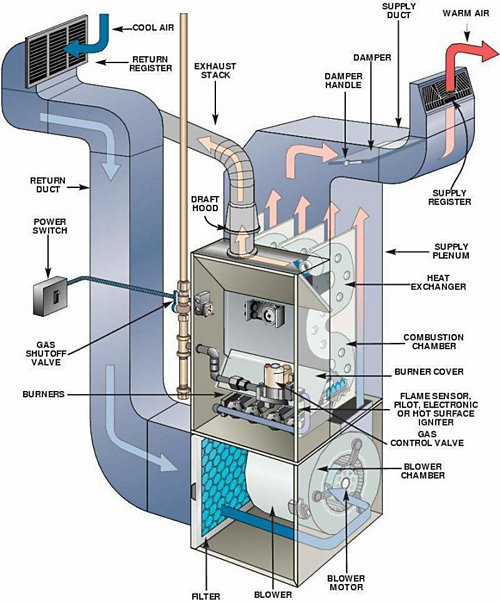How a Dependable Cooling And Heating System Enhances Indoor Air High Quality and Convenience
A dependable HVAC system is important for preserving interior air quality and comfort. It regulates temperature and humidity, producing a healthier living setting. Efficient air filtering gets rid of irritants and contaminants, while appropriate moisture levels stop mold and mildew development. Normal upkeep assurances peak efficiency, improving system performance. Comprehending these parts discloses just how they connect to develop a fresh ambience. However, the partnership between a/c systems and total well-being goes deeper than one could anticipate.
Comprehending the Basics of A/c Solutions
HVAC systems, basic for contemporary convenience, encompass ventilation, home heating, and air conditioning parts that collaborate to control indoor atmospheres. These systems are made to keep excellent temperatures, guaranteeing that rooms stay comfy regardless of outside climate condition. Heating components, such as furnaces or heatpump, give heat during chillier months, while cooling units cool down rooms when temperatures climb.
Ventilation plays a crucial duty, helping with the blood circulation of fresh air and getting rid of stale air, which assists in keeping a well balanced environment. Numerous kinds of cooling and heating systems exist, including streamlined and decentralized setups, each matched for different structure dimensions and purposes. Furthermore, modern developments have actually presented smart technologies, allowing for improved control over interior environment. Recognizing these fundamentals allows users to appreciate exactly how heating and cooling systems add to total health and convenience in domestic and industrial rooms alike, laying the groundwork for discussions on their influence on indoor air quality.
The Role of Air Filtration in Indoor Air Quality
A remarkable facet of keeping interior air high quality is efficient air purification, which plays a vital function in removing toxins and allergens from the environment. Heating and cooling systems equipped with high-grade filters can record a range of contaminants, consisting of dirt, plant pollen, pet dog dander, and mold and mildew spores. This purification process significantly decreases the concentration of air-borne bits, causing a cleaner and much healthier indoor atmosphere.
Routine maintenance of air filters is vital to assure peak efficiency. Clogged or filthy filters can hinder air movement, reducing the system's efficiency and potentially permitting contaminants to flow within the area. By replacing or cleaning filters as suggested, homeowners can improve their a/c system's capability to provide fresh air.
Moisture Control and Its Influence On Convenience
While numerous may concentrate on temperature policy, moisture control is just as important for keeping convenience in indoor settings. High moisture levels can bring about pain, making areas really feel warmer than they really are, while low humidity can create dryness, inflammation, and boosted vulnerability to breathing concerns. A trusted heating and cooling system plays a considerable role in handling interior moisture, ensuring that air is neither as well dry neither too wet.
Optimal humidity degrees normally vary from 30% to 50%, promoting a comfortable atmosphere. When moisture is well-regulated, passengers experience enhanced thermal convenience, improved indoor air top quality, and reduced risks of mold and mildew growth and allergen proliferation. Appropriate moisture control can shield furnishings and structural aspects from damage caused by too much dampness or dryness. Consequently, integrating effective humidity monitoring into cooling and heating systems is essential for promoting a healthy and pleasant interior atmosphere for wellness and performance.
The Significance of Routine Upkeep
Routine maintenance of cooling and heating systems is essential for ensuring peak efficiency and long life. This positive approach not only minimizes possible malfunctions but additionally improves energy effectiveness, which can lead to significant price savings over time. Set up inspections permit service technicians to determine and address concerns prior to they escalate right into expensive fixings, making certain the system runs efficiently.
Additionally, regular maintenance entails cleaning or changing filters, examining cooling agent levels, and examining air ducts, all of which add to perfect air movement and system performance. By preserving the HVAC system, home owners can also stop excessive deterioration on components, prolonging the total lifespan of the device.
A well-kept A/c system runs silently and securely, reducing the risk of hazardous scenarios. In conclusion, regular maintenance is an essential financial investment in both the efficiency of a/c systems and the convenience of interior atmospheres, inevitably promoting a healthier space.

Exactly How Heating And Cooling Equipment Reduce Allergens and Pollutants
Effective cooling and heating systems play a vital duty in reducing allergens and contaminants within indoor atmospheres, consequently enhancing general air quality. These systems utilize innovative filtering modern technologies that catch dust, pollen, mold spores, and pet dander, preventing them from circulating throughout the home. High-efficiency particle air (HEPA) filters are especially effective, trapping up to 99.97% of fragments as small as 0.3 microns.

Power Efficiency and Its Benefits for Wellness
Energy-efficient heating and cooling systems not only reduce power consumption but additionally have considerable health and wellness advantages for passengers. By optimizing power usage, these systems can maintain constant interior temperature levels, which helps prevent the development of mold and mildew and mildew. Managing moisture levels is necessary for breathing wellness, as excess wetness can exacerbate allergic reactions and asthma. Furthermore, energy-efficient systems frequently include sophisticated filtering innovations that enhance air quality by i was reading this getting rid of air-borne bits and pollutants, further improving total health.
Lower energy usage indicates minimized discharges from power plants, adding to cleaner outdoor air high quality, which indirectly supports the health of residents. With a concentrate on sustainability, energy-efficient cooling and heating systems promote a much healthier living setting. By spending in such systems, property owners not just save money on utility bills however also make a significant commitment to the health of their family members and areas. Ultimately, energy efficiency in heating and cooling systems promotes a healthier interior environment for all.
Enhancing Comfort Through Smart Modern Technology Integration
As wise modern technology remains to evolve, its integration right into HVAC systems significantly improves indoor comfort. Smart thermostats, for instance, permit customers to tailor home heating and cooling routines based upon their everyday routines, making certain ideal temperature levels when individuals are home. These devices can discover preferences gradually, changing settings immediately for maximum convenience.
Wise sensors keep an eye on indoor air high quality and moisture levels, supplying real-time responses that aids maintain a healthy atmosphere. By connecting with a/c devices, these sensing units can trigger modifications to air movement and temperature, making certain constant convenience.
Mobile applications additional encourage individuals, enabling remote of heating and cooling setups from anywhere, thereby giving comfort and adaptability.
Often Asked Concerns

Exactly How Can I Inform if My HVAC System Is Efficient?
To determine HVAC effectiveness, one visit this web-site can examine power bills for abnormalities, check for uncommon noises, monitor temperature consistency, guarantee appropriate air movement, and schedule routine upkeep. These aspects jointly show the system's functional performance and efficiency.
What Indications Show Poor Indoor Air High Quality?
Indicators of poor interior air quality include consistent smells, too much dirt buildup, enhanced allergic reaction symptoms, noticeable mold and mildew growth, and rising and fall humidity degrees. These indications frequently suggest that ventilation or air purification systems may be poor or malfunctioning.
Can a HVAC System Aid With Animal Dander?

How Often Should I Replace My Air Filters?
Air filters ought to generally be replaced every 1 to 3 months, relying on use and indoor air top quality. HVAC experts. Regular substitute assists maintain reliable air flow and decreases dirt, irritants, and other particles in the home environment
What Are the Expenses of HVAC System Installment?
The expenses of heating and cooling system installation commonly vary from $3,000 to $7,000, depending on aspects such as system kind, home dimension, and neighborhood labor prices. Additional features may boost overall costs significantly.
A trustworthy Cooling and heating system is necessary for keeping indoor air quality and convenience. A/c systems, essential for modern-day comfort, encompass ventilation, air, and home heating conditioning elements that work with each other to regulate interior settings. Reliable Heating and cooling systems play a necessary role in decreasing irritants and contaminants within indoor environments, thereby boosting general air quality. A HVAC system can significantly lower pet dog dander by making use of advanced filtering systems and regular maintenance (HVAC experts). The expenses of HVAC system setup generally vary from $3,000 to $7,000, depending on factors such as system type, home size, and neighborhood labor rates